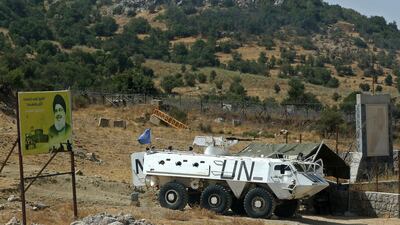The UN Security Council remains at odds over the way the UN peacekeeping mission in southern Lebanon operates on the ground, with the United States backing Israel’s demands for major changes.
At a closed council meeting on Tuesday about the mission known as Unifil, whose mandate is up for renewal at the end of the month, US Ambassador Kelly Craft stressed the need for a new mandate.
“The US has long reiterated publicly and privately that the status quo in Lebanon is unacceptable,” Ms Craft said after the meeting.
“Now is the time to empower Unifil, end the long complacency, and enable the mission to fully achieve what it was set out to accomplish.”
But Ms Craft faces an uphill struggle because most of the council backs a continuation of the current Unifil mandate.
Secretary General Antonio Guterres has written to the council calling for a 12-month renewal of Unifil’s mandate, stressing the importance of maintaining high troop strength.
Unifil was created to oversee the withdrawal of Israeli troops after a 1978 invasion. The mission was expanded after a 2006 war between Israel and Hezbollah militants so that peacekeepers could deploy along the Lebanon-Israel border to help Lebanese troops extend their authority into their country’s south for the first time in decades.
Germany’s deputy UN ambassador Gunter Sautter told the council in remarks circulated by the country’s UN mission that “recent tensions and the danger of escalation only underline the importance of Unifil presence on the ground.” He said “the new political reality” since last week’s devastating explosion at Beirut’s port made it “more important than ever.”
“Unifil’s mandate continues to be of utmost importance,” Mr Sautter said. “It is clear that Unifil will not be able to do more with less. We therefore fully support Unifil in its current mandate and strength, and we hope that the council will once more show unanimous support to this important mission.”
Israel has repeatedly accused Iranian-backed Hezbollah militants of impeding the peacekeepers from carrying out their mandate.
Israel’s former ambassador Danny Danon said in May that Israel will insist that peacekeepers have access to all sites, that they have freedom of movement and that any time they are being blocked the UN Security Council must be immediately informed.
Ms Craft said at that time that Unifil was being “prevented from fulfilling its mandate” and Hezbollah had “been able to arm itself and expand operations, putting the Lebanese people at risk.”
She said the Security Council “must either pursue serious change to empower Unifil or realign its staffing and resources with tasks it can actually accomplish.”
France is expected sometime this week to circulate a draft resolution to continue Unifil’s operations, and diplomats are predicting tough negotiations before the mandate expires on August 31.
As of June 15, Unifil comprised 10,275 military personnel from 45 troop-contributing countries, 238 international civilian staff, and 580 national civilian staff.
Its Maritime Task Force comprised six vessels, two helicopters and 864 of the force’s military personnel. However, one vessel was damaged in last week’s deadly explosion and over 20 naval personnel were injured, two critically.
Jan Kubis, the United Nations special coordinator for Lebanon, and UN peacekeeping chief Jean-Pierre Lacroix briefed Tuesday’s virtual council meeting.
Mr Kubis urged the rapid formation of a new government following Monday’s resignation of Prime Minister Hassan Diab and his Cabinet.
The UN quoted him as telling the council: “There are immediate humanitarian needs that need to be addressed and necessary reforms that need to be undertaken without any delay to restore the trust of the Lebanese people, and of the international community in Lebanon.”


